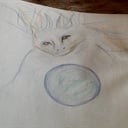What are tetrapods?
The superclass Tetrapoda, or the tetrapods, comprises the first four-limbed vertebrates and their descendants, including the living and extinct amphibians, reptiles, birds, mammals and some ancient, exclusively aquatic creatures such as the Acanthostega. Tetrapods evolved from the lobe-finned fishes around 390 million years ago in the middle Devonian Period, with modern tetrapod groups having appeared by the late Devonian, 367.5 million years ago.
While most species today are terrestrial, the first tetrapods were fully aquatic. Amphibians today generally remain semiaquatic, living the first stage of their lives as fish-like tadpoles. Amniotes evolved about 340 million years ago. One population of amniotes diverged into lizards, dinosaurs, birds and their relatives, while another diverged into mammals and their extinct relatives. Several groups of tetrapods, such as the caecilians, snakes, cetaceans, sirenians, and moas have lost some or all of their limbs. In addition, many tetrapods have returned to partially or fully aquatic lives throughout the group's history.
More Info:
en.wikipedia.org












